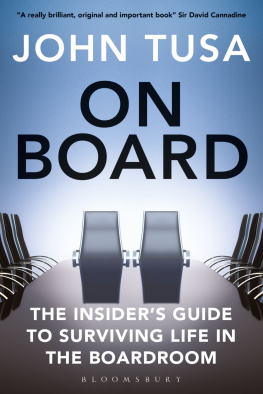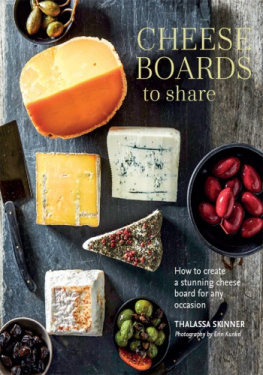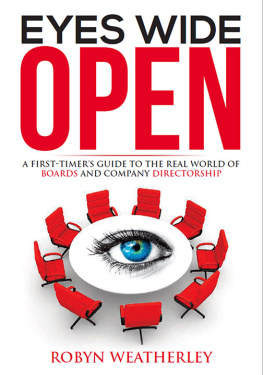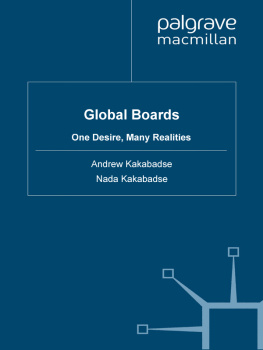On Board is a serious story lightly told, with numerous hints and tips along the way on how boards behave and how they should. Every board member should read it and learn.
Baroness Joan Bakewell, broadcaster, writer and
President of Birkbeck, University of London
John Tusa is one of the bravest and most thoughtful public servants of a generation, and one of the
people I admire most in British public life.
Rory Stewart, author, writer and politician
John Tusa deals with the great and seldom asked questions: why do chairs and chief executives not get on? Why do boards make the wrong appointments? What does a great board look like? His answers based on huge experience are vital reading for chairs and trustees everywhere. This is a book on an important subject full of insight and interest: essential reading!
Lord Tony Hall of Birkenhead CBE, Chairman of the
National Gallery and former Director-General of the BBC
For anyone considering joining a board, especially one in the arts, this is an excellent guide for what awaits them. It gives a clear sense of how the complex issues and relationships are handled from someone who was there, and lessons in good governance have rarely been so fluently expressed. And for those interested in many leading characters of the London arts scene over the past 20 years, this is a hugely entertaining read.
Sir Andrew Likierman, Professor and former Dean, London Business School
With outstanding insight, John weaves his way elegantly through misunderstandings, personal ambition, indecision, and incompetence to illustrate with clarity, the consequences of flawed Chairmanship, board composition, mistaken beliefs, and finally the privilege and honour of being part of a Board that gets it right.
Lady Alison Myners, Chair of Royal Academy Trust
One of the truly great and good, John Tusa has led many of Britains cultural institutions and led them brilliantly. This book explains, modestly but straightforwardly, how he has dealt with boards of trustees as helmsman, nanny, confessor, policeman, plotter, and Scout leader. Necessary reading for anyone involved in schools, arts organisations or other non-profits.
Richard Sennett, Chairman of Trustees, Theatrum Mundi
Sir John Tusa has enjoyed a career of remarkable range, breadth, variety and distinction, as a journalist, broadcaster, historian and arts administrator, and also as a fully paid-up and card-carrying member of the nations great and good. In this timely, original and deeply important book, he recalls his experiences as a trustee and chairman of some of our foremost (and occasionally troubled) cultural institutions. On Board should be essential reading for anyone who cares about our nations cultural life, and about the (good and bad) ways in which our great cultural institutions have been run and are still being run today.
Sir David Cannadine, author, historian and Dodge Professor of History at Princeton University
On Board is an arresting and enlightening survival guide for anyone who aspires to sit on a not-for-profit board. It makes an eloquent case for the public value of the independent and good governance of our intellectual and cultural institutions and the inherent obstacles to achieving it. This is also a riveting and, at times, excruciatingly candid account of personal learning. On Board charts the perilous navigation between the Scylla and Charybdis of personal rivalries and collective prevarication on which so many boards can come to grief. Anyone asked to join such a board will be well advised to learn from Tusa how codes, management theory and mission statements cannot substitute for decency, humanity and rigour, so much more difficult to achieve than to prescribe. In the end, good governance depends on good behaviour.
Tim Gardam, Chief Executive, Nuffield Foundation, former Principal of
St Annes College Oxford and former Chair, Ofcom Content Board
OTHER BOOKS BY JOHN TUSA
Conversations with the World
A World in Your Ear
Art Matters: Reflecting on Culture
Engaged with the Arts: Writings from the Front Line
Pain in the Arts
On Creativity: Interviews Exploring the Process
Th e Janus Aspect: Artists in the Twenty-First Century
Making a Noise: Getting it Right, Getting it Wrong in Life, the Arts and Broadcasting
WITH ANN TUSA
The Nuremberg Trial
The Berlin Blockade

Contents
This book could not have been written without the extraordinary cooperation of dozens of my former colleagues, with whom I served on so many boards. I am most grateful to them for their openness and candour in recalling some often-turbulent times past. I value their time in reading the chapters in which they were involved and reviewing any direct quotes attributed to them. I hope the excavation of recollections of sometimes distant battles proved to be interesting and enlightening rather than painful.
Many offered valuable and perceptive observations on my text. I was happy to incorporate most of them. The book is far better as a result. To any who may feel that their comments were disregarded, I can only offer the justification of a difference of opinion. The book might not have been written at all without some firm and friendly counselling by two former Clore Fellows, Isabel Mortimer and Emily Gottlieb. They transformed my inexplicable reluctance to start writing into a clear sense of wanting to do so I could not be more grateful.
My work was made much easier by the speed and efficiency with which Kate Foot transcribed the great majority of the interviews.
I was supported and encouraged during the writing by Ian Hallsworth, Publisher, Bloomsbury Business, and Matt James, Assistant Editor. They have been efficiency personified.
It was a privilege to serve with so many wise chairmen, remarkable executives, capable administrators, shrewd board colleagues on several great national arts institutions. My time was immeasurably enriched by their company, their thoughts, their actions. I do not write in detail about my time on the boards of the BBC or the Barbican. Those experiences were covered in my memoir Making a Noise .
One person saw, observed, witnessed all of it, took part directly in some of it: my wife, Annie Tusa. Much more than a hidden hand on my shoulder, more the constant presence.
Throughout the world, hundreds of thousands of people give their time, skills and energy to serving on a board of some sort. Many would not think of their activity in this way; many would hardly think of it at all, others as a social duty, a community act. Yet from parish councils to schools to clubs to the largest multinational corporations, the non-executive board often carrying out a trusteeship role plays a critical part in the ultimate success of the organization. They do not run it; they watch over it, they supervise it. The ultimate responsibility for an organization is theirs but they should not interfere in the way it is managed. This is the central paradox of the activity of governance.
It is right that business schools and management theory examine how boards should work and what happens when they fail. They are usually dressed up in the overall word governance, a life-deadening notion, yet one that cannot be ignored.
Few such studies capture the actuality of the work and business of a non-executive board: the human interplay, the rows and rivalries, the interactive psychology of behaviour among colleagues, the costs and consequences, the career casualties of board failures, whether caused by indecision, incompetence, misunderstanding, inadvertence or just plain rivalry. A well-functioning board will enhance, or even help transform, an organization, while a badly run board can undermine the institution for which it is responsible.








